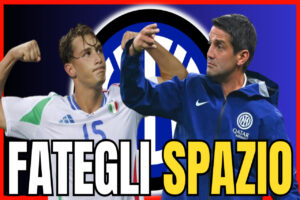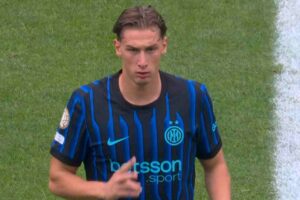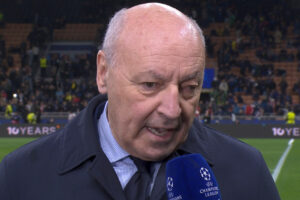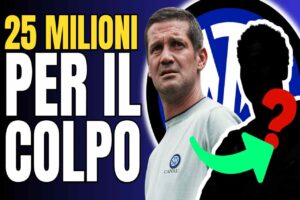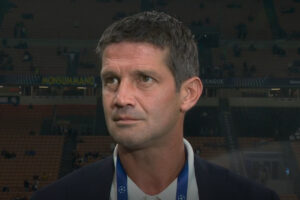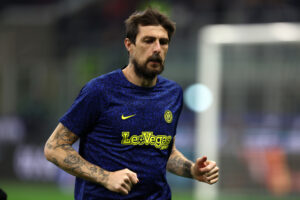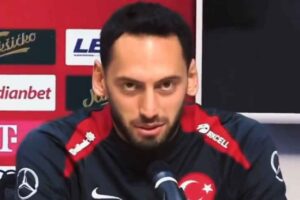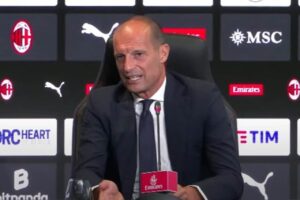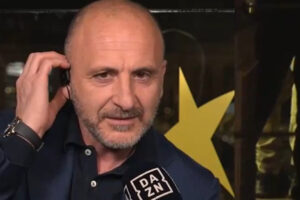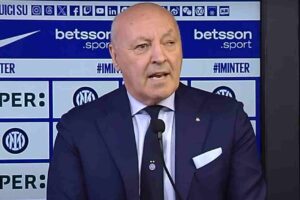Taking advantage of the break for the National teams, Henrikh Mkhitaryan presented his new autobiography this week. A book in which he retraces his career and the many stages he experienced before arriving at Inter. The Armenian midfielder was therefore the protagonist of a long interview published this morning in the pages of La Gazzetta dello Sport:
Micki, your life has changed: from 5th most present last season to only 11th this season.
“Actually, for me nothing changes: I don’t measure commitment by the minutes spent on the pitch. I keep working and fighting until the end, in training and in matches. I know I’m not playing with the same consistency as before, but I also understand that, at almost 37 years old, it’s normal to bring in young players who are the future of the club. For Sucic, who often plays in my position, I’m only happy: he’s strong, has quality and personality, and will bring Inter success in the coming years.”
But is Sucic a… Mkhitaryan?
“Sucic is Sucic. He’s serious like me, applies himself and loves to learn, even languages: he knows that by speaking Italian, he’ll help even more. That’s also why he’ll have a great future. As a modern midfielder, he’s very impressive: he has excellent technical qualities, is physically strong and already runs a lot. He still needs to grow tactically, but he’s only 21…”
This applies to you, but also to others: how difficult is it to leave your comfort zone after so long?
“It’s not, if you think that change is always good: I’m convinced of it. If you want to win, you have to adapt quickly, accept choices and transformations, not complain, otherwise you end up destroying the team’s balance. With us, for example, no one does that and everyone is open to change. I’ve had many coaches in my career, of all kinds, and I’m used to changing my way of playing. In football and in life, those who know how to challenge themselves win.”
And how are you doing it with the new coach?
“Even if some things are similar, the work we do with Chivu is different from what we did with Inzaghi. Tactically, it’s a slightly more vertical game, we try to finish the action as soon as possible, with more aggression, but it also depends on the opponent: you don’t always have the space. You have to understand when and how to do it. It’s about details, which are what make the difference.”
What is it like to discover the starting lineup only three hours before kickoff?
“It’s not something you have to like or dislike: you just have to accept it, that’s all. I understand those who prefer to know earlier, to prepare mentally, but you have to be ready regardless. In fact, knowing if you’ll play only at the end helps you stay focused. If instead you think ‘I’m not starting anyway’, you risk having a negative attitude that hurts you and the team.”
How would you define Chivu’s revolution?
“It’s early, we’ve only been working together for a few months, but I really like his attention to every detail. He’s very meticulous, a trait of great coaches. Training with him is intense and particularly fun. They confuse everyone, give extra motivation, but are also definitely tough. They always keep you focused, a feeling that helps you on the pitch. In general, Chivu was good at making us turn the page mentally after the end of last season: you can’t change the past, but you can write the future.”
As you admit in your bio, in football you’ve always looked for a father figure: but Chivu is only a little older than you…
“Now that I’m 36, the age difference with many coaches is minimal: with Chivu there can’t be a father/son relationship, but more like a friend, or rather an older brother. Always with respect because he’s still the coach and I’m the player: the boundary exists, it’s sacred, it can’t be crossed.”
Speaking of older brothers, what advice would you give to Pio and Bonny, who are on the rise?
“I’ve already told them privately to be… more selfish. Strikers have to be because they’re judged by goals. They have to help the team, as they already do, but in the end only their goals will count. I always tell them: ‘You are the ones who have to make us win!’ I can help them with certain tactical details, but it’s up to them to work and put the ball in the net. Believe me, they already have a great present, but the future will be even greater, also because they know how to behave everywhere.”
What is the problem with their generation?
“If you look at the night sky, you see many stars. If you focus on just one, you don’t see the others anymore. The same happens with the phone: if you only look at that, you don’t see what’s happening around you. That’s why I don’t like it being used too much in the locker room or gym. This also affects performance: then on the pitch you lower your head, look only at the ball and don’t see your teammates. This is a disease for many kids, it goes far beyond football.”
Don’t you think, though, that there’s too much pressure on Pio?
“Yes, too much, and I don’t like it. He’s a 20-year-old boy with great potential, but he needs the right time. You shouldn’t exaggerate with expectations, otherwise you’ll ruin him. Everyone has to follow their own path, calmly, and you’ll see that soon Italy will enjoy this treasure.”
Modric is twice Pio’s age: does a Milan derby against him in midfield inspire you?
“It’s not a derby between us, it’s Inter-Milan. Modric, however, is an example for those who love this game and believe in football. He has had an extraordinary career and shows that with the right mentality you can last a very long time: I think he still has three or four years at the highest level. He pushes me to keep going too: I’m not talking about my contract expiring, but in general I want to play football as long as possible. All, however, on one condition: that I am still able to give something to the team. When I feel I no longer have the same strength, goodbye to everyone and thank you.”
Usually Inter always started as favorites, but this year you’re already chasing: does that change anything?
“It’s just a psychological game between teams to take off or put on the pressure. In the end, everyone wants and can win the scudetto. Look at the standings: after six games there are five or six teams up there, does anyone want to pull out? Napoli won it last year, but we can’t deny that we’re among the favorites too: it won’t be easy, but we’ll give everything to win back the tricolor.”
Can this cycle of away games, Rome plus Napoli, show the world who you really are?
“No, two games aren’t enough. Just as the two previous defeats weren’t indicative. It’s a journey, I can only say that we’re preparing to reap the rewards. The growth is evident, there’s not much left to complete the puzzle: just small details to fix to finally click. But a team, like a player, will always experience some low moments and not just highs. The important thing is to stay united, as a group and as individuals.”
After the disappointment with Napoli and the defeat to Monaco, is the desire for European revenge or for the scudetto greater?
“Negative events in life shouldn’t bring you down, but make you stronger. You have to think positively, work harder, improve yourself. For example, no one should believe from the start that we won’t have the chance to play in a Champions League final again. On the contrary, you have to want to try again, be hungrier.”
Do you regret never having, perhaps unfairly, the consideration reserved for the big names?
“Everyone has their own preferences and I play only to have fun, for the love of football, of life and also of myself. If I’m satisfied, that’s enough for me, and never mind if others don’t put me in the top ten or top hundred. Of course, if I had been bad, I wouldn’t have played for the clubs I’ve been at.”
Of the five languages you speak, which one do you ‘think’ in while on the pitch?
“With the language of football, unique and universal. The others help me translate something for others, even in training games, because I want to win those too.”
So choose a word from your heart that applies to all your ‘languages’.
“I simply say… life. Life. Vie. In Armenian kyankʿ and in Russian žiznʹ. My life is in football, it’s here that I’m happy, it’s here that I still want to be.”
That word of yours, ‘unplayable’, has instead become a cross to bear, but last season you also said: ‘Sometimes we feel too strong and we’re not focused…’
“Yes, it was a clear problem, we lost points because, unconsciously, we perhaps thought we would make it anyway. We’re all working on this together with the coach: we want to avoid falling into that mistake again. However, I still believe that if we train well and sacrifice ourselves, then for Inter everything really becomes possible. It’s not arrogance, but desire.”


